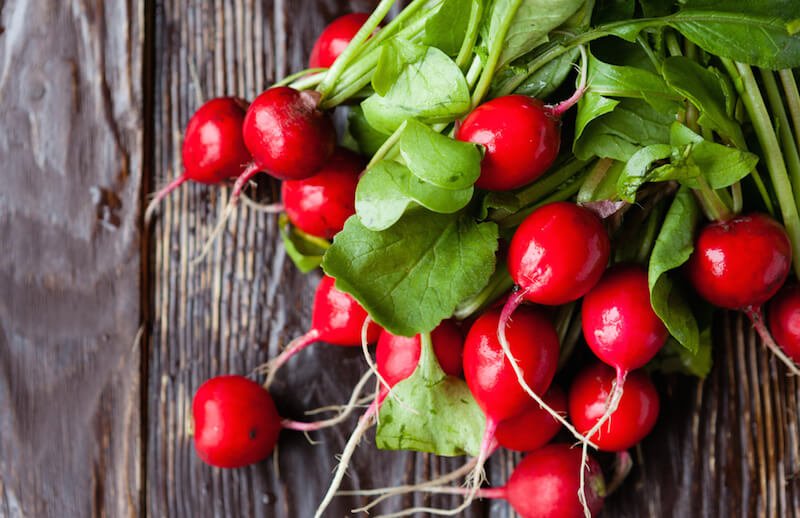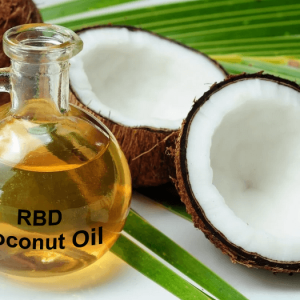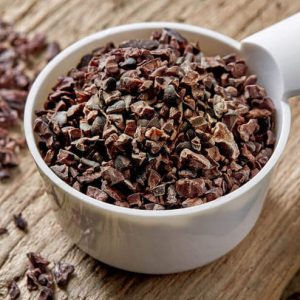When was the last time you ate a radish?
I was at the grocery store yesterday and something in my body spoke to me: “buy the organic radishes!”
This is interesting, because I usually never buy radishes as my cravings for them are almost non-existent. But as I was standing in line to purchase them, I wondered why I have never investigated the benefits that radishes have on the body (which now brings me to this article).
I was surprised to find that radishes are actually a great source of fibre, vitamin C and B6 and minerals zinc, riboflavin, potassium, copper, magnesium, manganese and calcium! They also taste really good too, make a great snack food and have a way of making salads look incredibly beautiful.
So, without further adieu, here are 10 unexpected health benefits of radishes!
1. Mucus-Busters
Radishes are great mucus eliminators , helping to loosen phlegm and clear the sinuses (especially for older individuals who usually have a hard time coughing up mucus). Excessive mucus is a sign that the body is in a state of agitation, and can be triggered by toxins, pollutants, food additives, and allergies. The two main foods that cause excessive mucus build-up are dairy and wheat, so if you eat a lot of these foods, start eating radishes!
2. Aid digestion
Rich in dietary fibre, radishes are great for helping alleviate digestive distress and regulating the bowels. They help to eliminate stagnant food matter that has been sitting in the colon for months, which in turn reduces toxin re-uptake and makes the skin glow.
3. Protect against cancer
Radishes are a type of cruciferous vegetable, which means they contain glucosinolates that inhibit cancer cell growth and induce apoptosis (cell death) of cancer cell lines. One study found significant cell growth inhibition and induced cell death of cancer cells with radish root extract.
4. Prevent viral infections
Radishes are an excellent source of vitamin C and zinc, both of which help strengthen the immune system. Vitamin C attacks the nucleic acid of viruses, and destroys them before they get a chance to proliferate. It also helps fight bacteria until they’re dead. Vitamin C is also a potent antioxidant that helps combat free radicals, and allows your immune system to better deal with invading bacteria and microbes.
5. Detox superfood
Phytochemicals in radishes like indoles and powerful flavonoids like zeaxanthin, lutein, and beta-carotene are all helpful detoxifying agents that help purge toxins from the liver, gallbladder, stomach, and colon. As mentioned above, radishes are also a great source of glucosinolates (especially black radishes), which are believed to enhance detoxification.
6. Reduce Inflammation
Radishes contain a unique molecule called indol-3-carbinol (13C), which is common amongst the cruciferous family. This molecule helps reduce inflammatory intermediates in the blood, which normally cause inflammatory symptoms at the site of infection or injury. Thus, they help soothe rashes and skin disorders (acne, dermatitis, psoriasis, etc.) and reduce pain and swelling.
7. Cardiovascular support
These awesome little vegetables also help our heart and vessels too! They contain a significant amount of potassium that helps balance fluid in the body by eliminating excess sodium via their diuretic effects (thus lowering high blood pressure). Compounds in radishes called anthocyanins also help inhibit red blood cell damage by supplying fresh oxygen to the blood (and therefore prevent cardiovascular disease)
8. Kidney enhancing benefits
Acting as a natural diuretic, radishes help purify the kidney and urinary systems, and also help halt any burning sensations experienced during urination. They help prevent infections in the kidneys, too, and can treat many different urinary conditions that are triggered by excess toxins in the body.
9. Prevent respiratory problems
Thanks to their pungent flavour, anti-inflammatory effects and mucus-clearing benefits, radishes are a wonder food for relieving congestion and sinus issues and preventing problems linked with asthma and bronchitis. Ever tried horseradish, and experienced the extreme sinus-clearing after the fact? That’s what radishes do, but are more gentler than the extreme heat you may experience from horseradish or wasabi.
10. Help treat jaundice
Radishes contain enzymes like esterase, amylase, diastase, and myrosinase, which stimulate bile production and regulate bilirubin production. Too much bilirubin will trigger a yellow tinge in the skin, a type of jaundice caused by the liver not being able to break down bile production faster than it is being produced. Radishes also help reduce red blood cell damage, which is common among those suffering from jaundice.










I don't like raw radishes, but I recently started to saute them with potatoes and other vegetables. The hotness is gone and they are very good cooked.
Oh interesting! I love radishes raw – they're like candy 😀
Cooking destroys enzymes